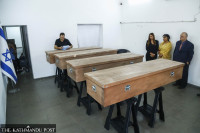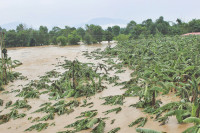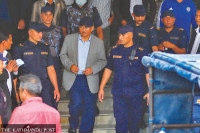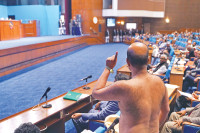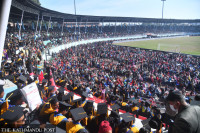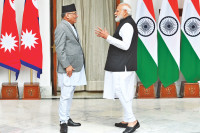Special Supplement
Tremendous growth
For a doctor his age, Dr Bishal Gyawali’s achievements are already hard to match. Even before he formally began practicing Oncology, a branch of medicine that deals with cancer, his articles and research had garnered attention the world over. Now at just 30 years old, Dr Gyawali is an adviser to the British Medical Journal, a medical consultant at Anticancer Fund—a not-for-profit organisation based in Belgium, and associated with the prestigious Institute of Cancer Policy in the United Kingdom.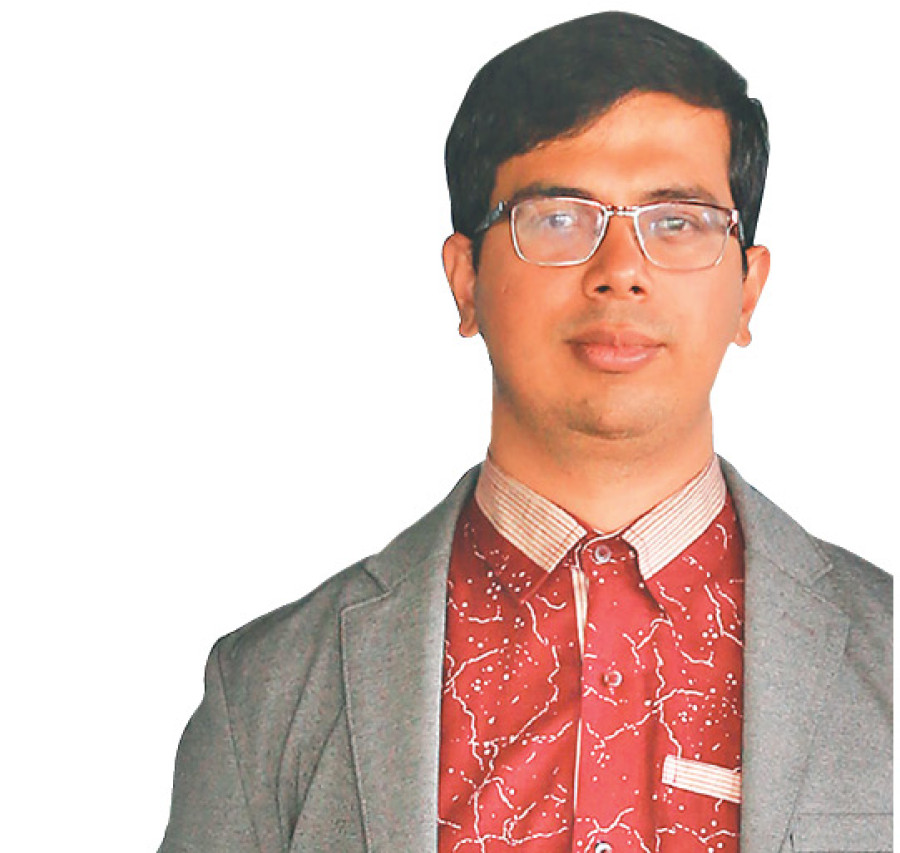
Manish Gautam
For a doctor his age, Dr Bishal Gyawali’s achievements are already hard to match. Even before he formally began practicing Oncology, a branch of medicine that deals with cancer, his articles and research had garnered attention the world over. Now at just 30 years old, Dr Gyawali is an adviser to the British Medical Journal, a medical consultant at Anticancer Fund—a not-for-profit organisation based in Belgium, and associated with the prestigious Institute of Cancer Policy in the United Kingdom.
Doctors and experts in the field of Oncology began noticing Dr Gyawali, who practices at the Civil Service Hospital, Min Bhawan, when he started publishing his papers that questioned and criticised poorly-conducted trials and many other questionable practices in Oncology. His central point in all his publications was that patient care should be at the heart of Oncology and treatment should not always be mechanical and divorced from sufferings of the patients.
Board first to Student of the Decade
For those who have followed the Board First category publicised by the government until few years ago, Dr Gyawali is not a new name. A young 15-year-old Gyawali had bagged the title of Board First in the year 2002 from New Horizon School, Butwal. But Dr Gyawali’s academic success did not stop there–he also topped the +2 examination and stood first in Institute of Medicine (IoM) entrance examination. By the time he completed his MBBS from IoM, he had bagged seven academic gold medals. All these academic successes culminated with the honour of being named the ‘Student of the Decade’ by the government in 2011 for his extraordinary academic performance over the years.

Dr Gyawali as a student being felicitated for his academic achievements.
The awakening
Following his graduation from IoM, Dr Gyawali was able to secure a scholarship from the Government of Japan to pursue a PhD in Oncology at the Nagoya University Graduate School of Medicine, Japan. There, after being exposed to the larger arena of medical research, Dr Gyawali started making a name for himself as not just a brilliant student, but also a researcher challenging tried and tested methodologies of Oncological care.
During his third year as a doctoral fellow, Dr Gyawali came across a 32-year-old Japanese patient, who was suffering from terminal adrenal gland cancer and his condition was further exacerbated by ascites, a condition where fluids accumulates in the abdomen.
Because he was very young, the patient could not accept the fact that there was nothing that medicine could do for him.”We usually don’t see patients the same age as us with Cancer. One day, I went and talked to him for a long while. I tried my best to convey to him that there was no more treatment that could be done, and that death was imminent,” Dr Gyawali recalls.
There on, when the patient’s ascites became even more aggravated, he began having tremendous trouble with basic bodily functions such as breathing. As a solution, Dr Gyawali proposed “tapping” and draining the fluid by fixing a tube into the body that the patient could drain himself when he felt uncomfortable. The proposal was met by scepticism by other physicians, who worried that fixing a needle in the patient for a long duration would risk infection and would drain excess minerals from the body.
“But I kept arguing for the treatment,” Dr Gyawali says, “My logic was that the patient had been given a prognosis of a month at the most. An infection would have shortened his life by a few days. Would we allow him to be more comfortable in whatever time he had left, or would we prolong his life by a week, even though he continued to suffer unable to breathe?”
Dr Gyawali also fondly remembers the bond that he built with the patient. “One day when I went to visit the patient, he greeted me with a ‘Subha Prabhat, Namaste’, and conveyed that he was trying to learn Nepali,” the doctor says, “If you know that you are going to die in the next three weeks, what would you do? Learn a new language? This question really haunted me. It really helped me internalise that the patients in our care have their own personalities, personal histories and aspirations; that it was not always necessary to cure the disease; sometimes just being there for the patient, as a friend, means more than prescribing medicines.”
“I also realised that a cancer diagnosis affects so many other people who love and care about the patient,” he says, “Every patient is different—they have their own past and relationships with their families. So, a treatment should take into account all these variables. We cannot be looking at a patient in isolation; as just another body that comes through the conveyor belt.”
“We doctors have become too mechanistic. We should see the patient as a whole and realise their suffering,” Dr Gyawali adds. “This is what I have been trying to convey through my lectures and talks.”
Exposure through Journal articles
Following his experience with this patient and many others like him at the Nagoya University, Dr Gyawali began publishing articles in some of the most reputed journals of medicine and Oncology—like JAMA Oncology, Journal of Clinical Oncology, Annals of Oncology and Lancet Oncology.
In all of these publications, the doctor began digging into data to find questionable findings. For instance, in one paper, published in the Annals of Oncology in April 2017, Dr Gyawali argued that a drug called Sunitinib should not be prescribed to patients who have undergone operations for renal cell cancer because the benefit was minimal or none, but toxicity was substantial. The paper circulated in several countries and oncological societies used his paper as evidence to not recommend sunitinib after renal cell cancer surgery.
In another instance, Dr Gyawali questioned the recent surge of mammography tests in Low-Income Countries (LICs). In his Journal article titled “Should Low-Income Countries Invest in Breast Cancer Screening?” he argues that “Mammography—the most commonly used screening tool in Developed Countries—reduces breast cancer-specific mortality among women of age group 50–69, but the evidence is not so clear for younger women. Further, it does not reduce the overall mortality.”
The publication argued that compulsory mammography which remains on the rise, harms women below the age of 40 because it unnecessarily risks the chances of over-diagnosis and overtreatment. “Oftentimes, a mammography, in a young patient, detects non-cancerous tumours, but the patient undergoes a treatment for cancerous treatments regardless,” says Dr Gyawali, “The harm is already done. In order to avoid such over diagnosis and overtreatment, governments and doctors need to base their screening policy on data, rather than on financial motives or mimicking the trend practiced in other developed countries.”
In another important article Dr Gyawali published in JAMA Oncology with Dr Prasad at Oregon Health and Sciences University, US, he challenged the global recommendation to use an expensive chemotherapy drug called Pemetrexed in non-squamous, non-small cell lung cancer. That article made big news and was covered by Medscape Oncology, a popular online platform used by doctors and medical experts.
Another important policy-influencing paper Dr Gyawali published was “Low Value Practices in Oncology Contributing to Financial Toxicity” where he lists nine examples of low-value practices in cancer care that provide little to no benefit for the patient but substantially increases costs. This article also made news in Medscape Oncology where one US doctor got so frustrated at a Nepali doctor pointing fingers at global cancer practices that he even commented “Really? American patients should follow the advice of a doctor who practices in a country with a per capita income of $2,200?”
A case for “cancer groundshot”
Then in 2016, “Cancer Moonshot” gained prominence when it was announced that the billion-dollar project would work on curing cancer through research and treatment by the then US Vice President Joe Biden. In contrast, in one of his lectures, Dr Gyawali, instead argued that the focus should be on “Cancer Groundshot”, a word that quickly spread among the Oncology community and the media.
Cancer Groundshot, a phrase coined by Dr Gyawali, means that investment should be made on known interventions that can cure or prevent cancers, are easy to implement globally and are affordable. One example, he cites, is cervical cancer. He explains that cervical cancer can actually be prevented by ensuring HPV vaccination and screening, and that no women in 21st century should be dying of the disease. However, more than two-thirds of cervical cancer cases are from low-and-middle income countries where such vaccinations and screenings are not in place. While ‘Cancer Moonshot’ focuses on finding newer targets and drugs to improve cervical cancer in advanced stages, Gyawali’s idea of groundshot focuses on investing on vaccinations and screening which would save more lives globally with a fraction of budget.
In this way, going against the grain, the young doctor from Butwal has already made a name for himself in the medical world.
But what does the future hold for him?
As one of renowned Oncologist from Israel recently wrote about Dr Gyawali, he is, “Brave, thoughtful, honest. Who would have thought that a Nepali, trained in Japan, would be a major Oncology thought leader in the whole world. Cream rises to the top.”
Or, as Richard Lehman, a popular columnist, wrote about Dr Gyawali on Twitter, “In the US, & even more so in UK, self-destructive madness is kicking down the good work of decades. But you are the true future.”




 9.7°C Kathmandu
9.7°C Kathmandu
